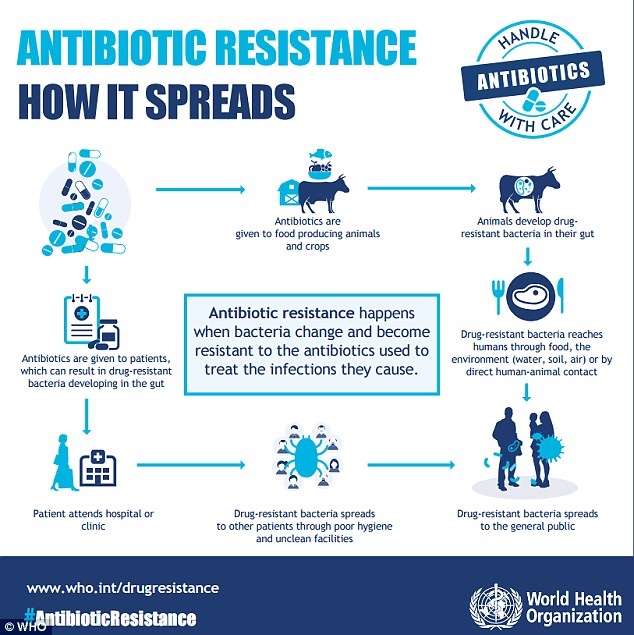
Dr Safwaan Desai, Executive Manager: Clinical and Policy at Metropolitan’s Health Division, answers some questions pertaining to the rise of antibiotic resistance in the form of the so-called ‘superbug’, separating fact from fiction.
What are antibiotics and how do they work?
Antibiotics are medicines used in the treatment of bacterial (and some parasitic and fungal) infections. They work by either killing bacteria in the body or preventing them from reproducing. In this way they support the body’s natural defences in fighting off infections.
How do bacteria become resistant to antibiotics?
The evolution of bacteria (mutation) is a natural phenomenon. Mutation allows bacteria to change the way in which they react to medicines and to pass on these mechanisms to subsequent generations of their species.
Resistance is aggravated by careless use of antibiotics, failure to complete the course of treatment (resulting in residual bacteria left in the body), and repeated exposure of the bacteria to the same antibiotic (over-prescribing).
How quickly do bacteria become resistant to antibiotics?
The time frame is variable and depends on the factors that promote resistance. As an example, Penicillin was effective after its discovery in the 1940’s, but by the 1970’s resistant strains had already emerged.
The Staphylococcus Aureus bacteria developed resistance to Penicillin as early as 1947! By the late 1980’s to 1990’s, many more varieties of bacteria had developed resistance to antibiotics.
Read: We are taking antibiotics too easily
How does it affect the body when a person takes antibiotics to which bacteria have become resistant?
In this case, the treatment is not effective against the infecting organism; the infection persists and worsens the clinical status of the person.
What are the restrictions regarding the distribution of antibiotics in SA?
In general, all antibiotics require a prescription from a doctor.
To what can one attribute the rise in consumption of antibiotics in South Africa?
Increasing antibiotic use is associated with:
- Inappropriate prescribing (using antibiotics for illnesses where they are not effective, for example for flu)
- Marketing influence from pharmaceutical companies
- Patient insistence on an antibiotic
- Practice volumes and doctor malaise (‘no time’ to explain why an antibiotic is not necessary)
- Doctors’ knowledge on the rational use of antibiotics
- Over-prescribing due to over-cautiousness and fear of medico-legal issues
Read: Know when it's necessary to take antibiotics
When should antibiotics be prescribed?
Antibiotics should be prescribed when there is a proven bacterial infection (identified through laboratory investigations). Where there is a strong clinical suspicion of a bacterial infection and there isn’t time to do laboratory testing, empirical treatment with antibiotics is also appropriate.
In addition, antibiotics should be prescribed to patients who require prophylactic treatment – for example, a patient with rheumatic fever who requires a dental or surgical procedure.
Are we too reliant on antibiotics?
Yes. There is a misguided belief that antibiotics are effective against all types of infections – in fact, one third of people mistakenly believe that antibiotics are effective for the common cold!
These days, pressure to return to work and to take care of daily activities drives the need to get ‘better’ quicker.
Are there alternatives to antibiotics?
There are antibiotic alternatives – i.e. other antibiotics. These can be divided into broad-spectrum and narrow-spectrum types.
These medicines directly target the organism, while there are other medicines that are used to manage the symptoms of the infection.
Maintaining a healthy lifestyle also helps support and strengthens the immune system, making one less susceptible to illness.
To what extent are current antibiotics becoming ineffective - is it only certain strains/groups of bacteria that are becoming resistant or bacteria across the board?
Multiple strains of bacteria are becoming resistant to antibiotics. The high profile ones include MRSA (Methicillin-resistant Staphylococcus Aureus), Vancomycin-resistant Staphylococcus Aureus, and MDR-TB (Multidrug-resistant Tuberculosis).
Viruses can also develop resistance to anti-viral treatment (as in the case of HIV).
How serious is this problem - should the public be concerned about the rise of the so-called “superbugs”?
The problem is already here – the WHO (World Health Organisation) stated in April 2014 that "this serious threat is no longer a prediction for the future; it is happening right now in every region of the world and has the potential to affect anyone, of any age, in any country.
Antibiotic resistance—when bacteria change so antibiotics no longer work in people who need them to treat infections—is now a major threat to public health."
The threat is all the more dangerous because the rate at which new antibiotics are being developed has slowed down considerably over the past few years, meaning that it is possible that at some point we may run out of antibiotic options. This situation is still a way off though.
For gonorrhea, which infects more than 1 million people every day, third-generation cephalosporins are the last resort. But treatment failure has already been confirmed in Austria, Australia, Canada, France, Japan, Norway, South Africa, Slovenia, Sweden, and the United Kingdom.
How is the unnecessary use of antibiotics in South Africa being curbed and what further steps should be taken in this regard?
Doctors need to take some time to explain when an antibiotic is necessary and should reinforce this message on subsequent consultations. In fact, this kind of intervention can be performed even when the patient is consulted for an unrelated event. It ‘sets up’ the thinking and action for appropriate prescribing at future visits.
Many hospitals and health facilities (in both the public and private sector) are establishing ‘Antibiotic Stewardship’ programmes. With the use of policies and protocols, these programmes govern when and which type of antibiotic to prescribe. It sets out infection control precautions and procedures to be followed under specific circumstances.
The programme drives similar thinking and action in medical professionals and is aimed at changing behaviour around antibiotic use.
For many years, infection control has been an important part of hospital practice.
The Federation of Infectious Diseases Societies of Southern Africa (FIDSSA) is a leading body in this field with broad membership and local and international representation on its committees. At individual medical practice level, posters and guidelines are shared with staff to embed correct behaviour and promote proper infection control.
Antibiotic misuse needs to be targeted both from a practitioner and a patient point of view. Broad-reaching programmes are effective in large facilities with resources to monitor and control access to antibiotics. Smaller facilities can implement awareness programmes and thereby drive behaviour change.
What certainly needs more attention is the public’s understanding of antibiotic use. While there is a growing trend among younger families to delay antibiotic use, the tide must shift further through wider education of communities to ensure that the threat of antibiotic resistance recedes.
We can only achieve this by a united, concerted effort by doctors and their patients to practice Good Medicine.
Read more:
How to avoid overuse of antibiotics
Seven hard facts about antibiotics we all need to swallow
Kids who take antibiotics gain weight faster




 Publications
Publications
 Partners
Partners
















